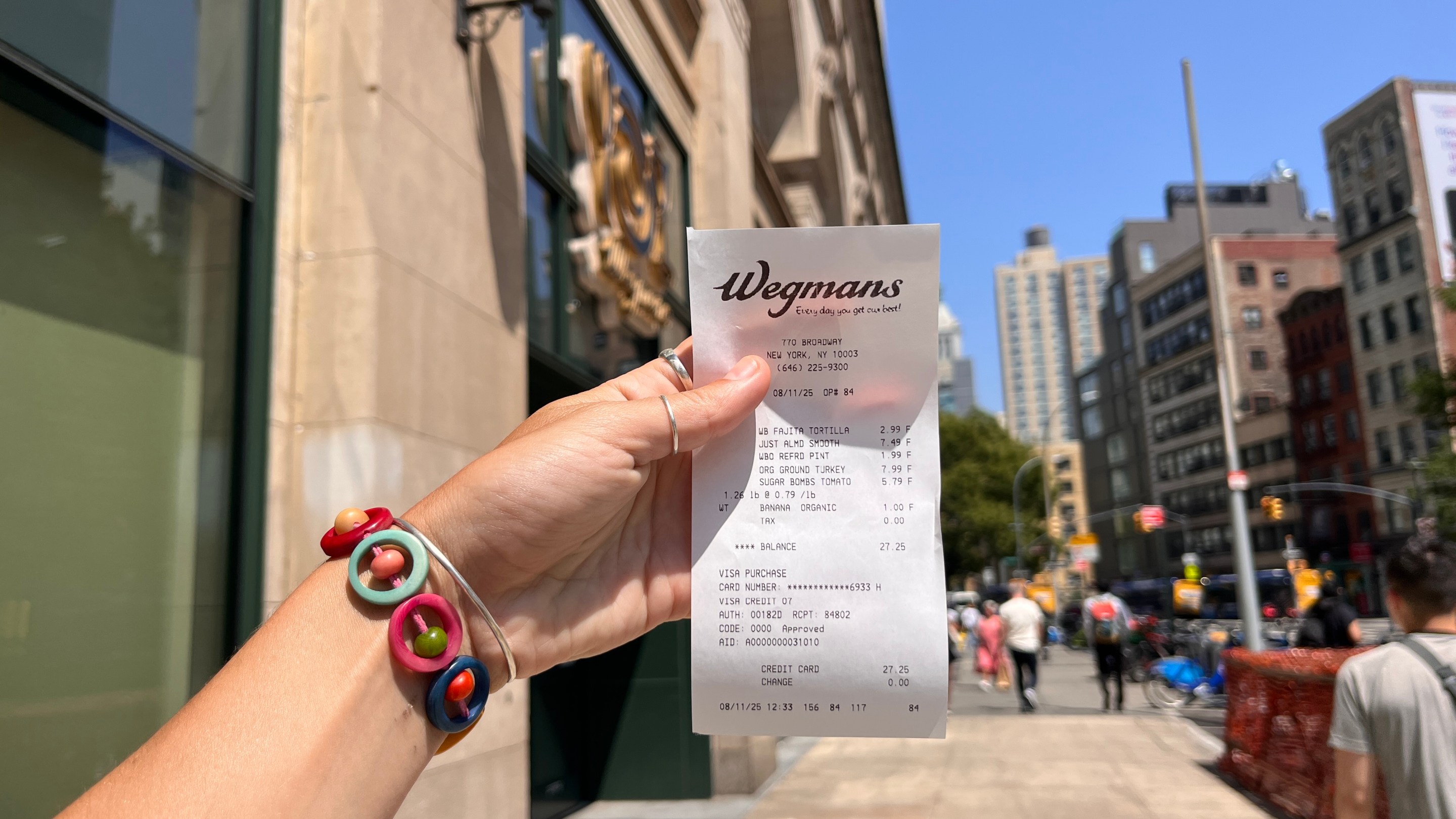Instacart is lobbying against a delivery worker minimum wage bill on the grounds that its service is a lifeline to low-income families. One thing is clear, however: its service is a ripoff.
For weeks, Streetsblog has been covering Instacart's fight against Intro 1135, which would force it to pay its workers a minimum wage, revealing the tech company's Astro-turf campaign to convince New Yorkers that they will suffer if a new wage requirement forces Instacart to raise prices.
Fact is: Those New Yorkers are already suffering ... if they use Instacart.
As a test, this reporter went to Wegmans and bought a representative sampling of groceries: a 16-pack of tortillas, ground turkey, tomatoes, a can of beans, almond butter, and bananas. The total? $27.25.
The same order on Instacart costs $47.84 – including $31.13 for the items, a $7.99 delivery fee, a $2.49 service fee, and $6.23 for a 20-percent tip. Thats 75 percent more expensive than picking up the food yourself. (Instacart is actually even more expensive because it only offered an eight pack of tortillas.)
The company’s argument, which is disseminated through its green-painted grassroots organization, "New Yorkers For Affordable Groceries," misses the real requirements of the minimum pay law. The company is not forced to raise prices, just pay the new rates. And it mischaracterizes Instacart's purpose, which to most is a pay-for-convenience perk rather than a necessity.
The bill passed with a veto-proof majority in the City Council last month, and Mayor Adams has until Wednesday to sign the bill or bow to Instacart and veto it.
The bill would close the famed "Instacart Loophole," which allows non-restaurant delivery companies to avoid the delivery worker minimum wage. And what a loophole it is: DoorDash is a mainly restaurant delivery app service, but it's been on the hook for the minimum wage for its grocery delivery workers — which means that workers who do the exact same job for DoorDash will get paid a minimum rate while workers who deliver for Instacart will not.
DoorDash and the other large restaurant app companies, like UberEats, support expanding minimum pay. DoorDash recently sent a letter to the mayor urging him to sign the pay parity bill.

The letter pokes more holes in Instacart’s affordability argument by revealing that DoorDash, through its own grocery delivery services, has gotten food to the homes of over 30,000 SNAP/EBT users in the city since minimum pay went into effect in 2023.
“Vetoing Int 1135 would not spare all NYC grocery delivery from regulation or higher costs. Thousands of grocery deliveries occur on platforms like DoorDash and those deliveries are already subject to the existing minimum pay requirements. That’s true for deliveries to NYC’s most vulnerable as well,” the July 31 letter reads.
DoorDash said it has not received a response from the administration.
And still the vast majority of the nearly 1.8 million New York City residents who rely on SNAP to afford groceries go to the store in person. SNAP benefits can be used to order groceries through Instacart, or another delivery service, but the benefits only cover the price of the food, not the onerous fees. So, despite the rhetoric, apps like Instacart make groceries more expensive for SNAP recipients (though Instacart does offer three free deliveries for SNAP users and reduced fees).
Also, grocery stores like Costco and Wegmans that are popular on Instacart actually charge around 15 percent more for items ordered through third-party apps. A carton of cage-free organic eggs ordered through Instacart costs $5.79, but the same eggs are $4.99 in store — which explains why our reporter's Instacart bill was more expensive than her Wegmans bill even before the delivery and service fees were tacked on by Instacart.
Instacart has continued to reach into its deep pockets to fight against the minimum pay expansion. New video ads on X and other social media from the so-called New Yorkers For Affordable Groceries double down on the idea that Instacart is a lifeline for food insecure New Yorkers.
85% of New Yorkers say the cost of food is rising faster than their income, and it’s about to get worse.
— New Yorkers for Affordable Groceries (@NYCGroceries) August 7, 2025
The City Council’s Int. 1135 could raise the cost of grocery deliveries by $10 or more per order.@NYCMayor: veto the City Council’s grocery delivery bill today!
The newest ad features Latoya Meaders, who founded Collective Food Works in 2020 after using her catering business to deliver food to New Yorkers in need during the pandemic.
"I've seen the cost of food go up tremendously in the past five years. Increased delivery costs would hurt our ability to serve our communities. Without grocery delivery it would make it very difficult to serve them. Mayor Adams, please protect our access to affordable groceries, please veto 1135 today," she says in the Instacart-funded ad.
Meaders says her non-profit's mission is to "create food access for those in underserved communities," but uses the rise in cost of living to argue against Intro 1135, even though the bill does not require Instacart to raise prices for consumers, just raise pay for workers, who are often low-income and can use better pay to improve food access for their families.
Instacart responded to Streetsblog's request for comment on the price difference between its services and shopping in-store with this statement from a spokesperson:
“Instacart is deeply committed to affordability, helping our customers save over $1.2 billion in 2024 alone. With access to hundreds of retailers across our platform — including many New York City retailers that offer same-as-in-store pricing, including Urban Market, Key Food Marketplace, Westside Market, and more — New Yorkers can easily compare prices and choose the options that best fit their budget.”
When asked the company clarified that it "saved" customers money through "deals, discounts, and loyalty savings" on its own services.






